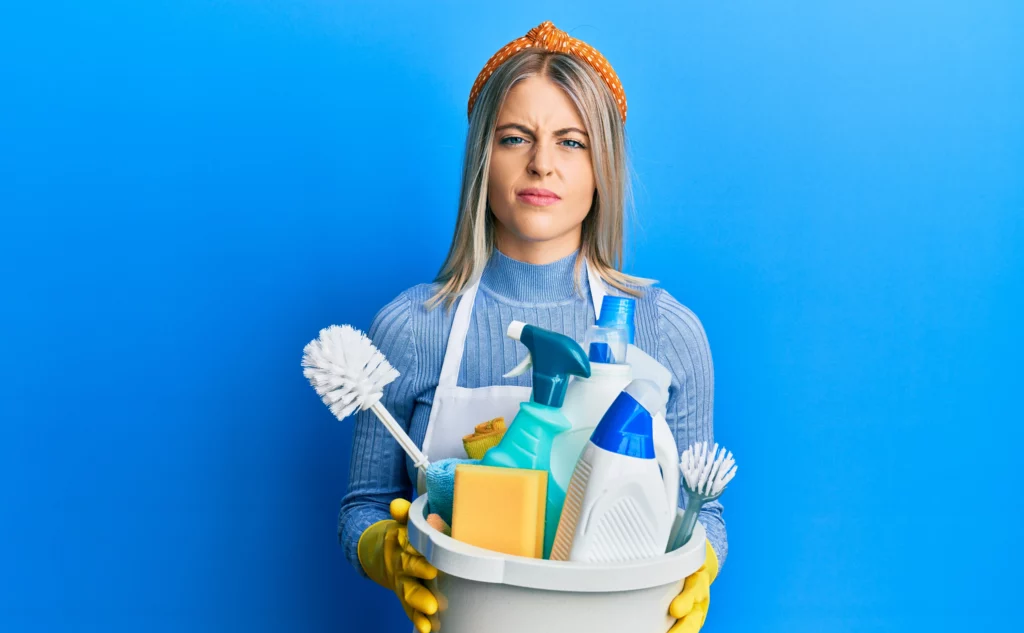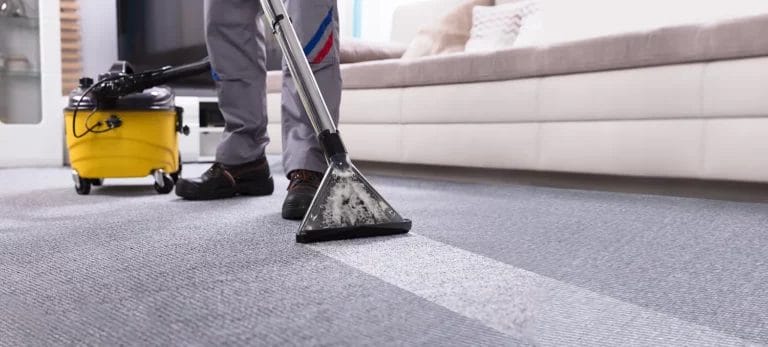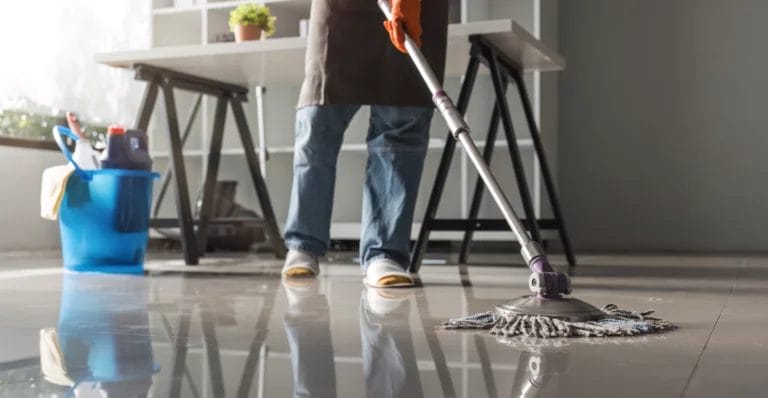Getting sued isn’t just a distant possibility; it’s a real risk for any cleaning business. From accidental property damage to on-the-job injuries or disputes over service quality, even minor mishaps can spiral into major legal headaches.
So, what happens when you get sued? For many cleaning business owners, the answer includes unexpected costs, emotional stress, and work disruptions.
Unpack the risks and see how cleaning business insurance can protect you in the face of a lawsuit.
Legal Risks Every Cleaning Business Could Face
Starting a cleaning business means dealing with a lot of moving parts, and some risks pop up no matter how careful you are. Let’s go over the most common legal issues you might encounter.
- Property damage while cleaning
You’re cleaning a client’s home, and disaster strikes — a bottle of bleach tips over, leaving a permanent stain on their carpet. Without insurance, you’d be on the hook for the cost of replacing or repairing the damaged property, which could run into hundreds or even thousands of dollars. - Slip-and-fall accidents
Freshly cleaned floors might look great, but they can also become a slip hazard. If a client or employee slips, falls, and ends up with a serious injury, you could face medical bills and even a lawsuit. - Employee injuries on the job
Cleaning jobs often involve lifting heavy equipment or working with chemicals. An employee injury could leave you responsible for medical costs and lost wages. - Breach of contract or service disputes
Imagine a client claims your work didn’t meet the agreed-upon standards and decides to sue you for breach of contract. Without insurance, you’d face the full cost of legal fees and any damages, potentially putting your business at risk over a single dispute. - Theft or misconduct allegations
What if a client accuses one of your employees of theft? Even if the claim is unfounded, you’ll likely face legal costs and damage to your reputation. Without bonds or coverage in place, clearing your name and rebuilding trust could take a significant toll on your business. - Third-party claims for accidents or injuries
While working at a client’s property, a visitor trips over your equipment and ends up injured. If they sue, you’d be responsible for medical bills, legal costs, and possibly a settlement. - Cyber attacks and data breaches
If you’re storing sensitive client information online, a cyber attack could expose it all. Without insurance, you’d face the costs of notifying clients, recovering data, and defending against lawsuits. - Damaged or stolen equipment
Imagine your cleaning equipment is stolen from your van or damaged during a job. Replacing it out-of-pocket could cost thousands, setting you back financially and delaying your ability to take on work.

What Happens When You Get Sued?
Getting sued can feel overwhelming, especially if you’re not prepared. Here’s a step-by-step look at what happens when you get sued:
- A lawsuit is filed against your business
The process starts with a formal complaint explaining why someone is suing you. Whether it’s due to property damage, an injury, or a contract dispute, this is your first signal to act quickly by contacting your insurance company and getting legal help. - File a cleaning business claim
If you have insurance, this is the point at which you notify your provider. You file a claim to involve your insurer, who will guide you through the next steps and review the situation. - Review the case with an attorney
Once you’ve been notified, your next step is to consult with an attorney. They’ll review the details of the case, explain your options, and help develop a strategy for your defense.
- File a cleaning business claim
- The claim is investigated
The insurer investigates the claim to verify the facts. This can involve reviewing contracts, interviewing witnesses, and assessing evidence. - Decide to settle or go to trial
After reviewing the case, you and your attorney decide whether to settle outside of court or go to trial. Settlements are usually quicker, but trials may be necessary if a resolution cannot be agreed upon. Likewise, your insurance carrier may also pursue a settlement in lieu of proceeding to a court case. - Pay legal fees
Legal expenses will start adding up throughout the process, including attorney fees, court costs, and more. Your insurance provider may assist with these costs as part of your policy. - Pay compensation or damages
If the case is resolved through settlement or a court ruling, you may need to pay damages. These could cover medical expenses, repairs, or other agreed-upon amounts. - Prepare for rising insurance premiums
Settling a claim may lead to increased insurance premiums. This adjustment reflects the insurer’s risk evaluation but allows you to remain protected moving forward.
How Insurance Protects Sued Cleaning Businesses
Facing a lawsuit? Don’t panic! The examples below show exactly how different types of insurance coverage protect cleaning companies when they get sued.
- General liability coverage
One of your employees knocks over an expensive vase that’s been in the family for generations while cleaning a client’s home. The client is understandably upset and sues your company for the damage, demanding not just the vase’s replacement but compensation for emotional distress and inconvenience.
General liability can cover legal fees, including attorney costs and court expenses. It also pays for the cost of replacing or repairing the vase, protecting your business from the financial burden of the lawsuit.
- Cyber liability coverage
You have an online booking and payment processing system where clients submit their credit card information. One night, hackers breach your system, and customer data is stolen.
Cyber liability provides coverage for notifying clients about the breach, helping pay for identity protection services, and covering fines you might face for failing to protect sensitive information properly.
- Tools and equipment coverage
While your cleaning crew steps out for a lunch break, someone sneaks into your storage area and steals several expensive cleaning machines and supplies. Without those tools, finishing the job and handling future bookings becomes nearly impossible, and replacing them could put a huge strain on your finances.
Tools and equipment, also known as inland marine, can cover the cost of the stolen items. This ensures you can replace your equipment quickly and continue working without disruptions.
- Additional insureds
You have a contract with a property management company to clean a series of office buildings. The property manager asks you to add them as an additional insured on your policy to ensure they’re protected if something goes wrong.
During the cleaning, a worker accidentally damages a piece of expensive office equipment belonging to one of the building’s tenants. By adding the property manager as an additional insured, your cleaning business’ insurance now also protects the property manager in the event of a lawsuit.
This coverage helps ensure that both you and the property manager are protected from financial loss and lawsuits due to accidents that occur while you’re on the job.
- Workers compensation coverage
One of your employees slips and falls while cleaning the bathroom of a client’s home. They suffer a back injury and can’t return to work for several weeks.
Workers compensation is designed to cover your employee’s medical bills and lost wages while they recover. With this coverage, your business can stay on track even when an employee gets injured.
- Commercial auto coverage
You’ve just sent your cleaning team to a client’s location, and while driving to the job, their van is rear-ended by another car. The van is heavily damaged, and the driver of the other vehicle claims they were injured in the crash.
Commercial auto can cover the costs of repairing or replacing your van. It can also help pay for the medical bills or legal costs resulting from the accident. Whether you’re transporting equipment, team members, or just heading to a job site, this makes sure your business stays mobile and protected in case of a crash.
- Janitorial service bond
You’ve been working for a high-profile client, cleaning their private office. One day, the client accuses one of your employees of taking personal property from their desk. The client is furious and threatens to sue for theft.
A janitorial service bond protects both you and the client. If an employee steals, the bond reimburses the client for their loss. Keep in mind that you’ll need to pay back the bond company for the amount they covered.
This bond helps maintain trust between you and your clients, showing that your business is serious about accountability, and it can help keep the situation from escalating further.
Common Insurance and Lawsuit Pitfalls to Avoid
Cleaning businesses often fall into some common but avoidable traps when dealing with insurance and lawsuits. With a little extra attention, you can steer clear of these mistakes.
- Ignoring policy gaps and coverage limits
One of the biggest mistakes we see is business owners assuming their insurance covers everything. In reality, many policies have exclusions, gaps, or insurance limits that leave you exposed. For example, you might have general liability, but if you don’t have cyber liability or coverage for tools and equipment, you’re still vulnerable.
Regularly reviewing your coverage and understanding your policy limits can help avoid costly surprises when you’re sued, simple as that!
- Not updating coverage as your business expands
As your business grows, so do the risks. If you hire more employees, expand your service area, or invest in new equipment, your insurance needs to grow with you. A lot of businesses forget to update their coverage to reflect these changes, leaving them underinsured.
- Failing to keep proper records of your business activities
Accurate records aren’t just for tax time — they’re crucial if you get sued. Without a clear record of your business activities, it can be much harder to prove your case or get your insurance claim paid.
So, keep organized documentation of contracts, employee training, and client communications to help you avoid unnecessary headaches down the line.
- Neglecting the need for additional insureds in contracts
When you’re working with other businesses or property managers, they may ask to be added as “additional insureds” on your policy. This means they’re protected under your insurance if something goes wrong while you’re working on their property.
Forgetting to add them could leave both you and your partner unprotected in the event of a lawsuit.
- Misunderstanding the claims process and deadlines
Insurance claims can be tricky, and businesses sometimes miss out on compensation because they don’t understand the process. Whether it’s missing deadlines for filing claims or not knowing exactly what’s covered, misunderstandings can delay or even deny your claim.
Get familiar with the claims process to ensure you’re prepared if something goes wrong, and if you’re unsure about anything, don’t be afraid to ask questions.

FAQs About Cleaning Business Claims
Can a lawsuit bankrupt my cleaning business?
Yes, a lawsuit has the potential to bankrupt your cleaning business if the financial damages exceed your resources and you’re not properly insured. A simple suit alone can cost $10,000 or more, depending on the complexity of the case and how long it lasts.
If you lose the case, you could also face additional costs for settlements or court-ordered damages, which could range from thousands to even hundreds of thousands of dollars. Without proper insurance, these costs could be devastating.
How long do I have to file a claim with my insurance after a lawsuit?
You should file a claim immediately after a lawsuit is filed. Most insurance policies have a specified timeframe for reporting claims, typically within 30 to 60 days, but reporting as soon as possible helps prevent delays in processing your claim. Always check your policy for specific deadlines to stay within the required time frame.
How does a lawsuit affect my cleaning business's insurance renewal?
A lawsuit can impact your insurance renewal by increasing your premiums or making it harder to renew your coverage. Insurers may view your business as a higher risk after a lawsuit, leading to higher rates.
Don’t Let a Lawsuit Derail Your Cleaning Business — Get Covered Now!
A single lawsuit can turn your business upside down, but the right insurance can help you stay on solid ground. Take the first step in safeguarding your hard work with cleaning business insurance designed to protect businesses like yours. Get a quote today and get insured in minutes!





